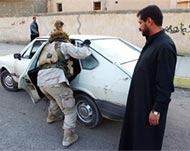Iraq’s Sunnis want election delay
Iraq’s Sunni Muslims dismiss Shia demands for early elections, and describe them as unreasonable at the present.

Speaking to journalists on Monday, Sunni tribal leader Shaikh Abd al-Wahab al-Zawbaai rejected the election demand made by Grand Ayat Allah Ali al-Sistani – labelling it as an unrealistic option.
“We see the conditions now as totally unsuitable for elections. People are in a state of chaos and there is no respect for the law.”
Iraqi Islamic Party spokesman Hashim al-Hasani spoke of the consequences of pushing through an unpopular quick vote, warning of violent civil war.
“It’s the nature of human beings: when you corner a man, he will react and defend himself. There are lots of weapons in this country… If people are pressured they will use these weapons to defend themselves.”
Sunni reservations
Arab Sunni leaders are unwilling to play a leading role in post-war Iraq.
 |
|
US forces distrust Iraqi Arab |
Dr Muhammad Ayash al-Kubaisi, spokesman for the Association of Muslim Scholars, the highest Sunni authority in Iraq, has told Aljazeera.net Sunnis are unwilling to get invloved in any political role while Iraq is still under occupation.
“Our stance remains the same, no participation in power as long as foreign troops still exist on our national soil” said al-Kubaisi.
The Shia have well-established religious authorities and Iraqi Kurds have an established political leadership and organisation.
|
“It’s the nature of human beings: when you corner a man, he will react and defend himself. There are lots of weapons in this country” Hashim al-Hasani, |
However, under the former Iraqi president, the Sunnis had largely dominated the security apparatus and the army. But all were disbanded by the US-led occupation administration in May 2003.
Even the tribal leaders who always played a dominant role in the Sunni community find themselves marginalised and unable to extend their influence because of the large interference in the tribal structure by the US army in Iraq.
Last December, major Sunni religious movements formed The Supreme Council of Shura for the Sunni in an attempt to create a leadership that would counter the balance of the other communities. But any positive effect is yet to be seen.
Election planning
A UN team is in Iraq to investigate the possibility of holding early elections before the US handover of authority to an Iraqi interim council in 30 June.
Washington wants elections to be held in 2005, but Shia religous leaders – who did not haave a say during the rule of secular Baath party – are pushing for them to be held as soon as possible.
Al-Kubaisi said that elections were not going to restore Iraq’s sovereignty. ” we strongly believe that liberating our Iraq from foreign domination is the first step towards real democracy” he said ” elections under occupation is just another step of consolidating the occupation.”